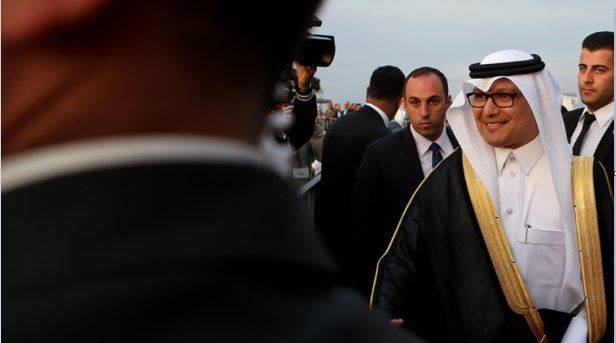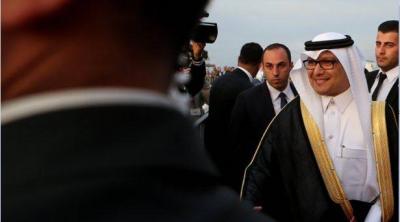The newspaper "Al-Joumhouria" wrote: The only glaring truth on the domestic scene is that people are tired of the exaggerations that accumulate on the doorstep of the electoral entitlement. Politically, it is noteworthy that the return of Gulf ambassadors to Lebanon is leaning towards a more open trajectory than what existed prior to the diplomatic rift between the Gulf and Lebanon. The effects of this return were manifested yesterday in the first visit of its kind in a long time, by the Saudi ambassador to Lebanon, Walid Al-Bukhari, to President Michel Aoun, announcing from the presidential palace in Baabda the "kingdom's support for the Lebanese people in these difficult circumstances they are experiencing." President Aoun received Ambassador Al-Bukhari yesterday. According to official information, the Saudi ambassador conveyed the president's congratulations on the occasion of the Easter holiday, and discussed the Lebanese-Saudi relations and the necessity of developing and activating them in all areas, where Ambassador Al-Bukhari affirmed "the kingdom's support for the Lebanese people in these difficult times." He also briefed the president on the mechanism of the Saudi-French joint fund dedicated to humanitarian support and achieving stability and development in Lebanon.
Meanwhile, the Kuwaiti ambassador to Lebanon, Abdul-Al Qunaie, visited Prime Minister Najib Mikati in the governmental palace, where Mikati renewed "the affirmation of the strong relations between Lebanon and Kuwait, thanking the State of Kuwait, its Amir and Government, for their constant support for Lebanon and their efforts to restore Lebanese-Gulf relations to their clarity and vitality." Al-Qunaie stated after the meeting that he discussed with Prime Minister Mikati the bilateral relations and issues of mutual interest to the two brotherly countries, "I expressed to him the wishes of the Kuwaiti political leadership and the Foreign Minister for the best relations with Lebanon and a bright future, and hopefully we will see this country in a better condition and future, hoping that the current distress and problems will pass." In response to a question, he said, "The return of diplomatic relations and ambassadors is an indicator of the success of this initiative, and that both sides in brotherly Lebanon and the Gulf have reached a mutual agreement that their shared history and destiny is eternal and more important than anything, and hopefully what happened is just a passing cloud, leading to further rapprochement and cooperation for the benefit of the two brotherly countries."
### The Tap of Exaggerations
The electoral entitlement is now exactly a month away, while the tap of exaggerations remains fully open, pouring over the heads of the Lebanese what they do not wish to hear from outdated political and party slogans, which have been tried in the past with clearly described failure, yet the exaggerators from their official, political, and party positions insist on repeating the same failed rhetoric, which has only accumulated failures, tensions, and deepening divisions. One of the worst outcomes of this trend is manifested in the two-year civil war that began on April 13, 1975, the anniversary of which passed yesterday, along with the subsequent wars and tensions that cost the Lebanese dearly.
### The Fire of Campaigns
In this context, it is tragic that no one has learned from those painful experiences, and no one has conducted a genuine, responsible, and critical review of the reasons for the country's collapse. The unfortunate reality is the stubbornness with the past and the insistence on neglecting a responsible national discourse that unites the Lebanese. This is evident in the tense rhetoric exchanged across the political divide, which intensifies in the current election period, putting the country in a situation of escalating campaign fires led by political and party factions, whose track record leaves no doubt that the path of change with them is impossible, especially as their previous, current, and certainly future performance is characterized by a lack of sincerity and an denial of their full involvement for a long time in the power that has brought the country down, resulting in a scandalous internal political, economic, and financial situation that worsens day by day.
### A Dark Stage
Despite the roar of campaigns, slogans, and electoral machinery dominating the scene, the image of the political situation in the country resembles a dark theater, where no one knows what is really happening in Lebanon or where the country is headed. None of the parties involved in this electoral entitlement have anything to assure them about the fate of the elections or whether they will be held on schedule. The vision is obscured by dark clouds that hide the path this entitlement will take on May 15.
### What's in the Scene?
The preparations show a continuous display of announcing the remaining electoral lists. This picture suggests that all parties concerned with the elections are preparing for them as if they will inevitably occur, actively mobilizing and gathering support to lead voters to the polls on May 15. Notably, the primarily political mobilization for this entitlement is more than tied to rescue programs for Lebanon that mirror the Lebanese people's longing to emerge from their crisis. However, despite these preparations, various stakeholders involved in the electoral entitlement do not reflect the reality of what is deeply felt among them, which appears to be hanging on a long string of question marks regarding the fate of the elections.
While the official levels approach the entitlement with an optimistic breath regarding its timely occurrence, in the absence of a definitive conclusion, the anxiety remains significantly high, which was confirmed by responsible political sources saying to "Al-Joumhouria": "The May 15 elections are established only on paper, and what is certain is that anxiety over this entitlement is growing day by day." According to reliable information to "Al-Joumhouria", this anxiety is not confined to internal parties but is significantly interacting within diplomatic circles, where this issue underwent diplomatic discussions intensifying recently, during which doubts were raised about the seriousness of Lebanese parties in holding elections, especially given the emergence of discouraging signs perceived by diplomatic tiers concerning logistical obstacles that suddenly arose at this timing, for which we currently have no confirmation of whether they are intentional. This seems to point directly to what has recently been raised regarding the judicial impediment, as well as issues related to teachers and others described as "obstacles".
### Month of Possibilities and Surprises
These atmospheres align with what is prevalent in different electoral statistics and studies centers; they share a near certainty that the results of the May 15 elections will not bring about a significant change in the parliamentary map compared to the current parliamentary council. However, they remain far from certainty regarding their feasibility, especially since the month ahead of the elections seems extremely heated according to the preparatory indicators from the competing political factions.
Amid the challenging environment, where there are ongoing discussions about obstructions and intentions to disable, it has noted that all parties appear apprehensive about the possibility of failing to hold elections. When asked about the potential image of Lebanon on May 16 if elections do not occur, their responses clearly reflect visible alarm.
According to a recent study highlighting prevailing sentiments, it has been noted that the various political factions are confronted with a significant concern that public sentiment is not responding as desired; the rate of undecided or withdrawn individuals within their supporting environments is exceedingly high, and none of the proposed programs seem convincing or enticing enough for voters in the midst of this ongoing crisis.
### Capital Control
On the other hand, the "Capital Control" bill underwent a round of discussion and debate in the joint parliamentary committees yesterday, where some articles of the bill were approved, including the protection of depositors' funds, while the ratification of the remaining articles was deferred to a session held by the joint committees next Tuesday morning. Deputy Speaker Eli Ferzli stated: "There was extensive discussion, primarily inspired by the representatives of the basic constitutional rights of depositors and their money in Lebanese banks."
Deputy Ibrahim Kanaan stated after the session: "For the approval of 'Capital Control', there must be capital and people's deposits, and before determining the losses and distributing them, a clear plan must be established, and 'Capital Control' must preserve people's interests." He added, "We are making amendments to the version of 'Capital' submitted by the government. We mentioned in the first article that deposits are protected by the constitution, and in practice, the distribution of losses should be fair and should not compromise people's efforts."
Deputy Ali Fayad remarked: "The country requires capital control, but not just any capital control. The basic criterion that must be considered at the legal level for the measures and exceptional regulations is the interests of depositors. Therefore, we succeeded today in changing the version that the government proposed so that it aligns with the justifications, and replaced it with a legal clause stating that the rights of depositors are enshrined constitutionally, and that the exceptional and temporary controls on transfers and cash withdrawals that this law includes do not impair depositors' rights to their funds."
Deputy George Adwan stated: "Today, we clearly and legally established the rights of depositors, and this law comes to temporarily suspend them exceptionally for a specified period, but the constitution protects these rights, and we will not accept them to be jeopardized at all. Secondly, claiming these rights, if we want to temporarily suspend them for a specified period, does not mean giving anybody a clean slate regarding everything that happened; accountability will continue. The state bears the greatest responsibility followed by the Central Bank and then the banks. We concluded this agreement on these principles, and the remaining articles will not come to establish committees that lead us back to totalitarian systems and control all the affairs of the country, as the work of the Parliament is not to grant authority to a committee to act arbitrarily concerning people's matters. We are here to put 'Capital Control' in place with a specific mission, while paying attention to a certain period and how we will preserve the rights of depositors and how we will emerge from this exceptional situation, and it must be linked to a comprehensive plan."
Deputy Qassem Hashim said: "The most important amendment to the 'Capital Control' law relates to the rights of depositors since it was ambiguous on this point, and it has been firmly established that depositors' rights cannot be infringed upon."




